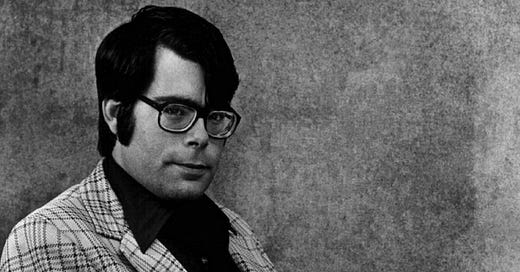I have low hopes for Elon Musk’s takeover of Twitter, mostly because I think pretty much all of social media is bad and should be relegated to the greasy dustbin of history. But I will give Elon credit for proposing a novel new scheme to charge people for “blue checkmarks.” A blue checkmark is a signifier that famous people can get appended to their profile to let visitors know that this is the real famous person in question and not a fake account. Charging $20 per month for that, as Elon has proposed, would bring in revenue and also drive up Twitter’s cachet by weeding out low-power users who just want a little blue check next to their names. Win-win.
Stephen King, however, is having precisely none of it:

Amazing. Steve, if they’re going to pay anybody to stay on the site, it’s not gonna be the guy who’s making 20-year-old pop culture references about irrelevant financial scandals. You can do better than this.
But the author raises an interesting if bumbling point: Should Twitter pay people like Stephen King—the power users of the site who drive a ton of engagement and generate a lot of clicks and hence revenue? The answer is no, but why?
The reason has to do with what exactly social media is, or rather how it functions. In a nutshell, websites like Twitter function by making use of the age-old Madison Avenue maxim: “If you are not paying for the product, you are the product.” In any exchange, someone is paying for something. Determining the revenue stream can be a bit opaque sometimes, but in Twitter’s case it’s pretty clear: Advertisers are the ones paying, and since you’re not buying anything, hmm, it must be you that the advertisers are paying for. You’re bought and sold! That’s just the way these companies run and they’re not about to change that. (Stephen King, of course, would not be charged to stay on the site; he’d just be charged for using a premium tier of it. That’s not unreasonable within the scope of Twitter’s function.)
Stephen King’s suggestion that Elon Musk “should pay him” is thus almost comical in its naivete. For 10 years the guy has been on Twitter providing Twitter with free work. You could argue that he got something valuable in return for it, but apparently it’s not valuable enough that he won’t just up and leave if he’s asked to shell out a truly infinitesimal fraction of his wealth to access a tiny portion of it.
I’m not trying to be mean here, but I feel like if a man’s been sweating it for a major corporation for a decade, for free, for a product that he doesn’t even appear to like all that much…well, he might just be a bit of a sucker. That’s Econ 102 though.
I suppose we’ve all been suckers for social media at some point. My hope is that the era of the social media sucker is coming to an end, and that we can all move past this miserable Internet paradigm into something better. Of course, if Elon can institute modest improvements to Twitter that can make it slightly less awful to use, that will be a welcome change. But color me skeptical. I can’t help but think that we’d all be immensely better off if these miserable tech corps went the way of…well, you know. Enron.



